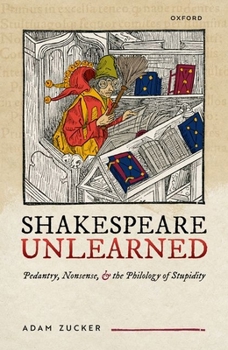Shakespeare Unlearned: Pedantry, Nonsense, and the Philology of Stupidity
Shakespeare Unlearned dances along the borderline of sense and nonsense in early modern texts, revealing overlooked opportunities for understanding and shared community in words and ideas that might in the past have been considered too silly to matter much for serious scholarship. Each chapter pursues a self-knowing, gently ironic study of the lexicon and scripting of words and acts related to what has been called 'stupidity' in work by Shakespeare and other authors. Each centers significant, often comic situations that emerge -- on stage, in print, and in the critical and editorial tradition pertaining to the period -- when rigorous scholars and teachers meet language, characters, or plotlines that exceed, and at times entirely undermine, the goals and premises of scholarly rigor. Each suggests that a framing of putative 'stupidity' pursued through lexicography, editorial glossing, literary criticism, and pedagogical practice can help us put Shakespeare and semantically obscure historical literature more generally to new communal ends. Words such as 'baffle' in Twelfth Night or 'twangling' and 'jingling' in The Tempest, and characters such as Sir Andrew Aguecheek and Holofernes the pedant, might in the past have been considered unworthy of critical attention -- too light or obvious to matter much for our understanding of Shakespeare and his contemporaries. Adam Zucker's meditation on the limits of learnedness and the opportunities presented by a philology of stupidity argues otherwise.
Format:Hardcover
Language:English
ISBN:0198906773
ISBN13:9780198906773
Release Date:December 2024
Publisher:Oxford University Press
Length:224 Pages
Weight:1.03 lbs.
Dimensions:0.7" x 6.4" x 9.3"
Customer Reviews
0 rating





